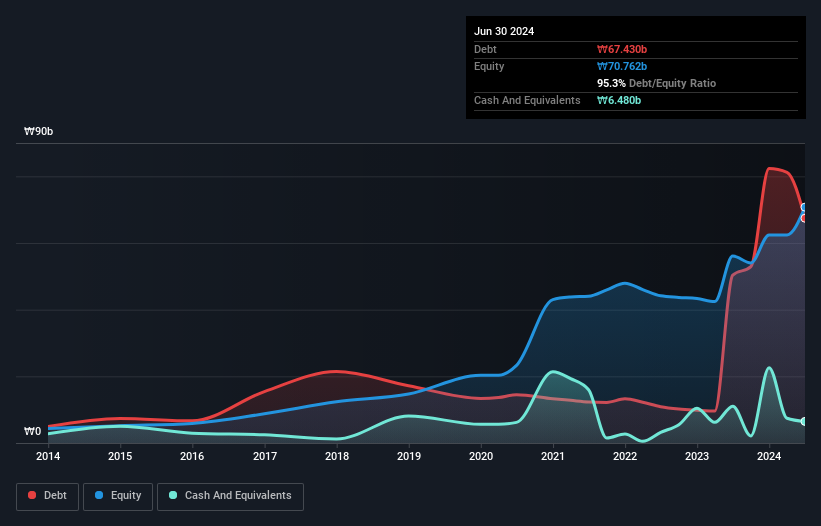
David Iben put it well when he said, 'Volatility is not a risk we care about. What we care about is avoiding the permanent loss of capital.' So it might be obvious that you need to consider debt, when you think about how risky any given stock is, because too much debt can sink a company. As with many other companies Solux Co., Ltd. (KOSDAQ:290690) makes use of debt. But the more important question is: how much risk is that debt creating?
What Risk Does Debt Bring?
Debt is a tool to help businesses grow, but if a business is incapable of paying off its lenders, then it exists at their mercy. If things get really bad, the lenders can take control of the business. While that is not too common, we often do see indebted companies permanently diluting shareholders because lenders force them to raise capital at a distressed price. By replacing dilution, though, debt can be an extremely good tool for businesses that need capital to invest in growth at high rates of return. When we think about a company's use of debt, we first look at cash and debt together.
View our latest analysis for Solux
What Is Solux's Net Debt?
The image below, which you can click on for greater detail, shows that at June 2024 Solux had debt of ₩67.4b, up from ₩50.4b in one year. However, it also had ₩6.48b in cash, and so its net debt is ₩61.0b.

How Healthy Is Solux's Balance Sheet?
The latest balance sheet data shows that Solux had liabilities of ₩70.4b due within a year, and liabilities of ₩13.9b falling due after that. Offsetting this, it had ₩6.48b in cash and ₩20.2b in receivables that were due within 12 months. So it has liabilities totalling ₩57.6b more than its cash and near-term receivables, combined.
Since publicly traded Solux shares are worth a total of ₩469.3b, it seems unlikely that this level of liabilities would be a major threat. However, we do think it is worth keeping an eye on its balance sheet strength, as it may change over time. The balance sheet is clearly the area to focus on when you are analysing debt. But it is Solux's earnings that will influence how the balance sheet holds up in the future. So when considering debt, it's definitely worth looking at the earnings trend. Click here for an interactive snapshot.
In the last year Solux had a loss before interest and tax, and actually shrunk its revenue by 7.0%, to ₩56b. That's not what we would hope to see.
Caveat Emptor
Importantly, Solux had an earnings before interest and tax (EBIT) loss over the last year. Indeed, it lost ₩3.3b at the EBIT level. Considering that alongside the liabilities mentioned above does not give us much confidence that company should be using so much debt. So we think its balance sheet is a little strained, though not beyond repair. However, it doesn't help that it burned through ₩1.4b of cash over the last year. So to be blunt we think it is risky. When analysing debt levels, the balance sheet is the obvious place to start. But ultimately, every company can contain risks that exist outside of the balance sheet. Be aware that Solux is showing 4 warning signs in our investment analysis , and 3 of those are significant...
When all is said and done, sometimes its easier to focus on companies that don't even need debt. Readers can access a list of growth stocks with zero net debt 100% free, right now.
New: Manage All Your Stock Portfolios in One Place
We've created the ultimate portfolio companion for stock investors, and it's free.
• Connect an unlimited number of Portfolios and see your total in one currency
• Be alerted to new Warning Signs or Risks via email or mobile
• Track the Fair Value of your stocks
Have feedback on this article? Concerned about the content? Get in touch with us directly. Alternatively, email editorial-team (at) simplywallst.com.
This article by Simply Wall St is general in nature. We provide commentary based on historical data and analyst forecasts only using an unbiased methodology and our articles are not intended to be financial advice. It does not constitute a recommendation to buy or sell any stock, and does not take account of your objectives, or your financial situation. We aim to bring you long-term focused analysis driven by fundamental data. Note that our analysis may not factor in the latest price-sensitive company announcements or qualitative material. Simply Wall St has no position in any stocks mentioned.
About KOSDAQ:A290690
Solux
Manufactures and supplies indoor, outdoor, and special purpose lighting products in South Korea and internationally.
Excellent balance sheet low.
Market Insights
Community Narratives


